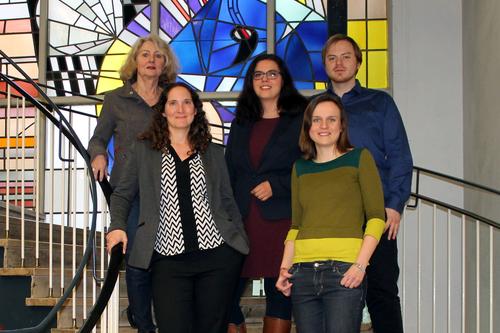DFG Funds New Research Project “Translocal Networks: Public Sphere in the Social Web” at the Institute for Media and Communication Studies
Prof. Dr. Barbara Pfetsch, Dr. Neta Kligler-Vilenchik, Jun.-Prof. Dr. Annie Waldherr, Daniela Stoltenberg, Daniel Maier
Image Credit: Lars-Ole Müller
A new research project, led by Prof. Dr. Barbara Pfetsch (FU Berlin) and Jun.-Prof. Dr. Annie Waldherr (University of Münster), is investigating digital urban public spheres. Starting in January 2018, the four-year project will focus on the Twitterspheres of Berlin and Jerusalem. The research will be conducted in cooperation with Dr. Neta Kligler-Vilenchik (Hebrew University of Jerusalem) and received roughly 500,000 Euros in funding from the German Research Foundation (DFG).
The way sociality is organized through spaces has undergone considerable changes over the last few decades. The relation between humans and their spaces is being re-negotiated due to social, political, and technological change, as well as resulting feelings of uncertainty. These processes can be described as re-figuration and are the focal point of the new collaborative research center 1265 “Re-Figuration of Spaces”, led by the Technical University of Berlin.
Daniel Maier (FU Berlin) and Daniela Stoltenberg (University of Münster) will conduct research for the Translocal Networks project. In it, they will investigate the urban public spheres forming on Twitter in the cities of Berlin and Jerusalem: With whom, in what locations, and about what topics do Twitter users communicate? How do virtual urban public spheres emerge from this usage? How do users synthesize global and local, virtual and material, as well as public and private spatial reference points into individual figurations of space? What subjective spatial knowledge do they relate to this?
To approach these questions, the researchers will collect Twitter data and investigate it using network analysis, geo-coding, and automated content analysis procedures. To tie in this evidence on the societal level with subjective experiences, ego-networks and survey data will be collected for a group of particularly active users.
Further Information